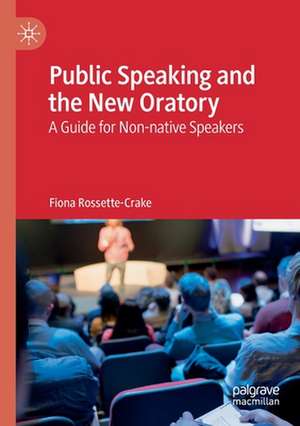Public Speaking and the New Oratory: A Guide for Non-native Speakers
Autor Fiona Rossette-Crakeen Limba Engleză Paperback – 16 aug 2020
| Toate formatele și edițiile | Preț | Express |
|---|---|---|
| Paperback (1) | 452.40 lei 6-8 săpt. | |
| Springer International Publishing – 16 aug 2020 | 452.40 lei 6-8 săpt. | |
| Hardback (1) | 587.53 lei 6-8 săpt. | |
| Springer International Publishing – 15 aug 2019 | 587.53 lei 6-8 săpt. |
Preț: 452.40 lei
Nou
Puncte Express: 679
Preț estimativ în valută:
86.59€ • 90.06$ • 72.56£
86.59€ • 90.06$ • 72.56£
Carte tipărită la comandă
Livrare economică 14-28 martie
Preluare comenzi: 021 569.72.76
Specificații
ISBN-13: 9783030220884
ISBN-10: 3030220885
Pagini: 285
Ilustrații: XIX, 285 p. 5 illus.
Dimensiuni: 148 x 210 mm
Greutate: 0.37 kg
Ediția:1st ed. 2019
Editura: Springer International Publishing
Colecția Palgrave Macmillan
Locul publicării:Cham, Switzerland
ISBN-10: 3030220885
Pagini: 285
Ilustrații: XIX, 285 p. 5 illus.
Dimensiuni: 148 x 210 mm
Greutate: 0.37 kg
Ediția:1st ed. 2019
Editura: Springer International Publishing
Colecția Palgrave Macmillan
Locul publicării:Cham, Switzerland
Cuprins
Part 1: Speaking in English: Getting Started.- Chapter 1: Fostering an Anglo-Saxon Ethos.- Chapter 2: Genre and generic competence.- Chapter 3: A discourse-analysis approach to public speaking genres.- Chapter 4: Public speaking versus conversation.- Chapter 5: Elaborate orality: speaking from a script.- Part 2: Staging an interaction with your audience.- Chapter 6: Comparisons between the language of conversation, writing and public speaking.- Chapter 7: Talking to your audience.- Chapter 8: Anchoring your speech in the context of delivery.- Chapter 9: Rhetorical Staging.- Chapter 10: Delivery, or action.- Chapter 11: Slideshows that reinforce the interaction.- Part 3: Structuring your speech for listenability.- Chapter 12: The syntax of the sentence.- Chapter 13: Managing information.- Chapter 14: Strategies for concision.- Chapter 15:Figures of repetition: functions.- Chapter 16: Repetition of words and accumulation: a typology.- Chapter 17: Macro-organisation.- Chapter 18: Connectives.- Chapter 19: Introductions, transitions and signing off.- Part 4: The New Oratory.- Chapter 20: Three-Minute-Thesis Presentations (3MT).- Chapter 21: Investor pitches.- Chapter 22: TED talks.- Chapter 23: Some characteristics of the New Oratory.
Recenzii
“This book fills a genuine gap in the material available for students of English. It is a highly practical manual with a strong theoretical foundation. It will be of great use to those whose courses or future careers involve the ability to address a public in English. … it could well be read with profit by English-speaking students who are anxious at the thought of having to speak in public.” (David Banks, Fachsprache, June, 2020)
Notă biografică
Fiona Rossette-Crake is Professor in the Department of Applied Languages at Université Paris Nanterre, France. Her research focuses on public speaking, particularly new forms that have developed over the past two decades.
Textul de pe ultima copertă
"This is a highly readable account of public speaking. It will provide students, particularly those whose native language is not English, with all the practical advice they need to make an effective speech or presentation (including newer forms, like three minute theses), grounded on a solid theoretical base."
-- David Banks, Professor Emeritus, Department of Languages, Université de Bretagne Occidentale, France
Fiona Rossette-Crake is Professor in the Department of Applied Languages at Université Paris Nanterre, France. Her research focuses on public speaking, particularly new forms that have developed over the past two decades.
Caracteristici
Focuses on the reality of English as an ever-developing, global medium of communication Deals directly with language resources and caters specifically to non-native speakers Highlights the new needs of public speaking practitioners, using examples of contemporary speech formats such as three-minute-thesis presentations and TED talks Follows in the tradition of applied linguistics, offering a balance between theory and practice
